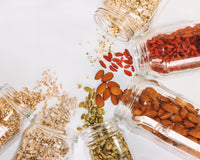More and more health professionals recognize the importance of the health of your gut to your overall health. Some have even suggested that the gut acts as a sort of "second brain" that communicates with the one in your head and influences everything else that goes on in your body. How can you make sure that your second brain stays healthy? Here are some tips.
Eat Right
One of the keys to maintaining a healthy GI system is to eat right, and that means choosing a diet that has a lot of fiber. Eat lots of fruits, vegetables, legumes and whole grains. Soluble fiber is the type that dissolves in water, while insoluble fiber doesn't. Both are fermented by bacteria in the intestines. Insoluble fiber guards against constipation since it makes your bowel movements regular and helps the GI tract maintain a healthy pH level. Soluble fiber lowers bad cholesterol and regulates glucose.
Other foods that contribute to a healthy tummy include yogurt that has probiotics. These are good kinds of yeast and bacteria. Pickled foods, such as kimchi or sauerkraut, also keep your gut healthy.
Talk With Your Doctor About Stomach Problems
If you have pain in your abdomen that doesn't seem to be going away no matter what you do or you suffer from constipation, diarrhea or both, don't hesitate to go to your doctor to see what's up. When it comes to the gut, serious problems and minor annoyances often share the same signs and symptoms. Also, keep in mind that untreated anxiety can cause gastrointestinal disorders.
Exercise
Among the many benefits of exercise is a healthier GI system. Not exercising leads to weight gain, and being overweight or obese can interfere, sometimes in surprising ways, with the health of your gut. Being overweight can put you at risk for nonalcoholic fatty liver, which will impact how well your body digests food. Obesity can also put you at risk of painful conditions, such as gallstones and gastroesophageal reflux disease (GERD). Other problems that can come with obesity include diarrhea, colon polyps, diverticulosis, and pancreatitis.
The things you can do to support the health of your gut, such as eating right, visiting your doctor when you think something's wrong and exercising, are simple things to do, even if they might not be easy at first. Making a habit of them will go far in making sure that your gut and the rest of you are in optimum shape.






